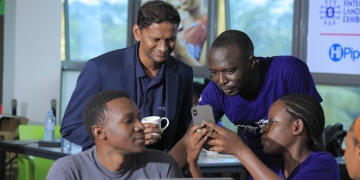
The financial technology (fintech) industry has embarked on efforts to digitalize payments. Fintechs have been recognized for transforming financial services in Uganda through digital technology.
The Bank of Uganda has recognized them for enabling financial inclusion through empowering individuals, businesses, and the entire financial sector.
Fintechs involve the use of mobile devices, internet banking, and digital wallets to make transactions. The most common digital payment system is Mobile Money powered by the telecom companies like MTN and Airtel.
Under their umbrella body, the Financial Technologies Services Providers’ Association (FITSPA) convened at the Golf Course Hotel in Kampala to explore how to further services like mobile money and micro-loans using digital technologies including technologies like artificial intelligence.
Sustainable Business for Uganda (SB4U), the Private Sector Foundation of Uganda (PSFU), and the European Union are part of the effort.
Financial Technologies Services Providers’ Association (FITSPA) Director Doreen Lukandwa explained that financial technology is one of the largest accelerators of Micro, Small, and Medium-sized Enterprise (MSMEs) as well as a catalyzer in the growth of the financial inclusion agenda.
Lukandwa says they are exploring a more responsible operating space to ensure the members comply with the laws.
She says compliance with the laws will foster internal checks and balances within individual companies, guaranteeing dutiful operations within, especially in the money lending space.
According to Lukandwa, companies must coordinate with the regulators by causing meaningful discussions through meetings and conventions.
“We need all the regulators in one room to be able to support the deepening of financial inclusion and the success of innovations to solve accustomed problems like lending. The reason that these money lenders exist is to solve a problem that people all the way to the grassroots have. How they are going about those are different conversations in terms of operation and those are some of the things we think to redress by causing conversations amongst the different regulators,” she stated.
The 2023 FinScope, the fifth of its kind is implemented by the Bank of Uganda in partnership with Financial Sector Deepening Uganda, Uganda Bureau of Statistics (UBOS), aBi – Agricultural Business Initiative, the Ministry of Finance, Planning and Economic Development, and several other stakeholders and sheds light on various aspects of financial inclusion of Ugandans aged 16 and above.
It found that financial inclusion in Uganda in 2023 was at 81% up from 77% in 2018. Financial inclusion was according to the report highest amongst men at 84% compared to women at 79% as well as for the urban population at 87% compared to rural at 78%. The report found that mobile money drives formal inclusion, although the use of banks and SACCOs has increased since 2018.
The study further found that mobile money is the most used service provider and that formal inclusion continues to be driven by mobile money. It found that the main barriers to formal financial services continue to be affordability, relevance, and awareness.
Sofian Dahmani, a Program Officer of the European Union (EU) Delegation to Uganda said the EU is deliberate in bridging the access to financing gap through scaling financial technology in the innovation landscape.
“Digitalizing financial services can reduce costs which allows providers to lower the price of their capital, while it also helps to leapfrog access to these services in rural areas. FinTechs also utilize algorithms that help to streamline the application for the finance review process, in turn, providing more and faster financing,” said Dahmani.
Dahmani said bridging the access to finance gap has predominantly been practiced in the agribusiness and green economy sectors, including sustainable tourism, where entrepreneurs are supported with skillsets to drive business growth and capacity to access capital.
He revealed that the EU has a web portal to facilitate access to both local and foreign financing.
“FinTech companies not only provide technological solutions to ease credit access for MSMEs, but they also help their clients to tap into global markets and increase their customer base, thereby contributing to business development, value addition, and more profits,” he further stated.










